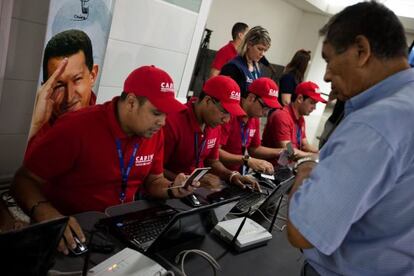Currency controls in Venezuela fuel dollar-shopping trips abroad
Maduro government declines to lift controls despite a rash of illegal schemes to obtain hard cash

While the September 11, 2001 terrorist attacks have led to changed procedures for airline passengers around the world, an additional security measure implemented in recent months in Venezuela has been making it much more aggravating for people who want to travel abroad.
Venezuelan government officials want to know how much money in foreign currency – specifically dollars – passengers are leaving the country with and, more specifically, if they are entitled to possess that amount.
The so-called “currency exchange trap” (cepo cambiario) is one of the torturous rites of passage people must go through at Venezuela’s international airports before boarding their flights.
Dressed in matching red shirts and baseball caps, representatives from the Foreign Exchange Administration Commission (Cadivi) pull passengers aside at random for inspection. They want to make sure that the passenger does not exceed the limit on the maximum amount of currency he or she is allowed to travel abroad with, and to verify whether they are carrying credit cards in other people’s names.
Cadivi is trying to stop the growing number of fraudsters who take advantage of another person’s allowed dollar quota while they are abroad. They are called in local slang raspacupos, or quota scrapers.
While official pre-authorization for dollars is never guaranteed, Venezuelans – typically the middle class who invade Miami in their thousands each week to shop at the popular name brand outlets, and even those who can never afford to travel abroad -- are taking advantage of a scheme that has become a profitable business that involves skirting the current national currency regulations.
Those who travel abroad – and there are even those who fake their travel plans – use their government-approved credit cards at certain businesses (nearby Aruba has become a popular destination) where they can obtain cash and receipts to justify their purchases when they return home.
Then, the dollars they bring back with them can be sold for a profit on the black market for up to 45 bolivars to the dollar when the official exchange rate is at 6.3 bolivars to the dollar.
The government is trying hard to stop this so-called “currency tourism,” which is having an immense effect on the availability of seats on flights coming in and out of the country while grounding those who really need to travel. The costs of airline tickets have also increased.
For example, an economy seat on a flight from Bogota to Madrid in February costs $2,568, but from Caracas the price $5,161 (or $32,514 at the official exchange rate).
There are two major reasons for this gargantuan price difference. First, Cadivi owes millions to the air carriers by selling the passenger tickets at controlled prices and the government does not reimburse them in dollars. The second reason is the enormous demand for tickets by Venezuelans and foreigners, who make a stopover in Caracas to exchange their dollars on the black market and pay for their final destination at the government-controlled price, which is very attractive.
Nevertheless, the president of the Institute for the Defense of People in the Access to Goods and Services (Indepabis), Eduardo Samán, said Tuesday that he also believes that the carriers are purposely blocking off seats assigned for cheaper tickets in economy or tourist class.
The government has promised to find a solution, but has declined to lift the strict currency controls.
Late President Hugo Chávez introduced the controls a decade ago to reduce capital flight and inflation, but this scheme has done little to curb the problem. Venezuela continues to be besieged by shortages of consumer goods while the annual rate of inflation rose to almost 50 percent in September.
Through an educational campaign on state-run Venezolana de Televisión, the government has blamed the quota-scrapers for “plundering” the treasury.
President Nicolás Maduro, who was elected in April, compared the dollar-hoarding phenomena to an illness, which he called cadivismo. Earlier this month, Maduro complained about the unwillingness by private sector leaders to agree to changes in certain policies because they claim they faced greater risks.
“All they want is Cadivi, Cadivi, Cadivi,” he complained. “That is what cadivismo does to you – it makes you sick.”
Tu suscripción se está usando en otro dispositivo
¿Quieres añadir otro usuario a tu suscripción?
Si continúas leyendo en este dispositivo, no se podrá leer en el otro.
FlechaTu suscripción se está usando en otro dispositivo y solo puedes acceder a EL PAÍS desde un dispositivo a la vez.
Si quieres compartir tu cuenta, cambia tu suscripción a la modalidad Premium, así podrás añadir otro usuario. Cada uno accederá con su propia cuenta de email, lo que os permitirá personalizar vuestra experiencia en EL PAÍS.
¿Tienes una suscripción de empresa? Accede aquí para contratar más cuentas.
En el caso de no saber quién está usando tu cuenta, te recomendamos cambiar tu contraseña aquí.
Si decides continuar compartiendo tu cuenta, este mensaje se mostrará en tu dispositivo y en el de la otra persona que está usando tu cuenta de forma indefinida, afectando a tu experiencia de lectura. Puedes consultar aquí los términos y condiciones de la suscripción digital.








































